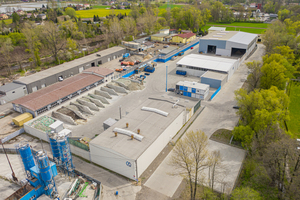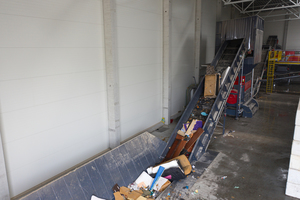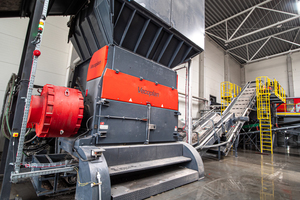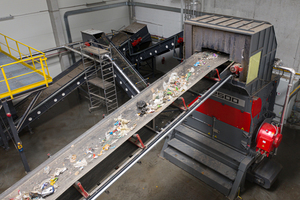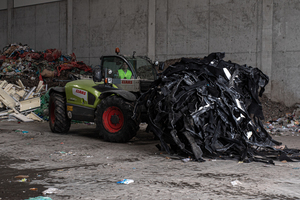Vecoplan supplies state-of-the-art shredding technology to Sanit-Trans:
Valuable waste
Secondary fuels can reduce the costs involved in the energy-intensive production of cement by replacing a large proportion of expensive primary fuels. Sanit-Trans also achieves this by processing various waste fractions into high-quality, refuse-derived fuels (RDF). Vecoplan supplied the shredding technology for a modern processing line during the Covid-19 pandemic – and the outcome? Installation and commissioning functioned very smoothly.
Alternative fuels replace expensive fossil fuels such as coal and oil, so they are a prerequisite for cost-efficient cement production. This is why the Polish company Sanit-Trans Sp. Z o.o. processes industrial waste, bulk waste, light fractions from municipal waste, empty packaging and other typical household items made of plastics, composite material and metal into high-quality RDF.
Shredding at the highest possible standard
A waste sorting plant, a recycling plant for glass shards and one of the most modern processing lines in the country for the production of high-quality alternative fuels have been in its headquarter in Międzyrzecze Górne since 2019/2020. Vecoplan AG was responsible for the supply, installation and commissioning of the company’s integrated shredding technology. The Polish company has relied on the machine manufacturer’s solutions since 2015.
“We have implemented a powerful two-stage shredding process that shreds different and demanding materials into one homogeneous output,” explains Ireneusz Suszyna, Area Sales Manager for Poland. The delivered material is collected at the receiving station. An employee picks it up with a front loader and feeds it onto a chain belt that transports the solid materials to a single-shaft pre-shredder of the VEZ 2500 TV series. The developers at Vecoplan have specifically reinforced all the machine areas exposed to exceptionally high forces and loads during the shredding process. An extraneous material detection system also protects the machines from large metal parts. Employees can easily remove extraneous material through the hydraulic bottom flap, speeding up the process by avoiding lengthy downtimes. Vecoplan has equipped the series with a HiTorc drive which works dynamically and has a powerful start-up phase and a high torque. The drive does not require any mechanical elements such as gears, belts, clutches or hydraulic units. The strong shocks and vibrations that occur during complex shredding do not pose any significant challenge for the HiTorc – in contrast to gear-driven units.
Also, less wear and less maintenance is required than with mechanical and hydraulic drives. The drive is fixed to the rotor shaft, so there are no power losses in the drive train, resulting in a much higher operational efficiency.
High-quality output
Now the VEZ 2500 TV continuously feeds the pre-shredded material onto an attached conveyor belt. The bulk material then enters the secondary shredding stage. Here Vecoplan installed a machine of the VEZ 2500 TT series which the company specially developed for RDF processing. Thanks to a high-performance cutting unit, the series is designed for maximum throughput. The patented W-rotor is installed which ensures both maximum cutting performance and an extremely high standard of technical availability.
More information at:
https://vecoplan.com/en/news/2023-03-vecoplan-liefert-hochmoderne-zerkleinerungstechnik-sanit-trans
Vecoplan AG is a leading manufacturer of machines and systems for the resources and recycling industry for shredding, conveying and reprocessing wood, biomass, plastics, paper and other recyclable materials such as domestic and industrial waste. Vecoplan develops and manufactures the systems and components and sells them worldwide in the wood reprocessing and waste processing industries. It currently has around 500 employees at its locations in Germany, the USA, Great Britain, Spain and Poland.

